A Text centred rhetorical analysis of Paul's Letter to Titus
A Text centred rhetorical analysis of Paul's Letter to Titus
A Text centred rhetorical analysis of Paul's Letter to Titus
You also want an ePaper? Increase the reach of your titles
YUMPU automatically turns print PDFs into web optimized ePapers that Google loves.
2.2.7 <strong>Titus</strong> 3:1-2: Persuading the Cretans <strong>of</strong> the compulsory<br />
treatment <strong>of</strong> all unbelievers in a manner consistent with sound<br />
doctrine<br />
Several commenta<strong>to</strong>rs consider this section as a continuation <strong>of</strong> the<br />
instructions given in 2:1-10 (Johnson, 1996:246; Quinn, 1990:182; Fee,<br />
1988:200; Collins, 2002:356). Mounce (2000:443) even views it as a repetition<br />
<strong>of</strong> 2:1-14. It is, however, possible <strong>to</strong> view this as a new section that introduces<br />
a different <strong>rhe<strong>to</strong>rical</strong> objective. Paul’s dominant <strong>rhe<strong>to</strong>rical</strong> objective can be<br />
summarised as persuading the Cretans <strong>of</strong> the compulsory treatment <strong>of</strong> all<br />
unbelievers in a manner consistent with sound doctrine. Commenta<strong>to</strong>rs agree<br />
that the pronoun auj<strong>to</strong>uv" refers <strong>to</strong> all believers. However, Quinn (1990:182)<br />
interprets the pronoun as a reference <strong>to</strong>, what he calls, the Jewish Christian<br />
opponents <strong>of</strong> 1:10, 16. Some differences are however noticeable between<br />
these two sections. The earlier section in 2:1-10 distinguished between<br />
various categories <strong>of</strong> believers, with instructions specific <strong>to</strong> each group. In the<br />
present section, the pronoun auj<strong>to</strong>uv" suggests that the earlier categories are<br />
now viewed as the collective group <strong>of</strong> Cretan believers.<br />
Thus far, <strong>Titus</strong> has been given many instructions. The verb uJpomivmnh/skw, in<br />
this instance, indicates another aspect <strong>of</strong> his ministry as a teacher <strong>of</strong> sound<br />
doctrine. It is also in the imperative second person singular like that <strong>of</strong> 2:15<br />
and expresses a continuation <strong>of</strong> the ministry <strong>of</strong> <strong>Titus</strong>, who here represents<br />
legitimate teaching. The choice <strong>of</strong> this word <strong>to</strong> describe an aspect <strong>of</strong> legitimate<br />
teaching could indicate a caution against accepting novel teachings. Paul<br />
turns the attention in this section <strong>to</strong> the whole congregation. The pronoun<br />
auj<strong>to</strong>uv" refers <strong>to</strong> everyone who was mentioned in chapter 2:1-10. The use <strong>of</strong><br />
the pronoun signifies a comprehensive expansion <strong>of</strong> the teaching ministry.<br />
Whereas in the previous section the apostle specified particular categories <strong>of</strong><br />
people, he now includes everyone by the use <strong>of</strong> the pronoun.<br />
Verses 1-2 are a single sentence in Greek. It contains a list <strong>of</strong> seven virtues.<br />
This is counterbalanced in verse 3 by a list <strong>of</strong> seven vices. The strategy that<br />
PDF created with pdfFac<strong>to</strong>ry Pro trial version www.pdffac<strong>to</strong>ry.com<br />
117

















